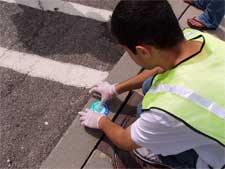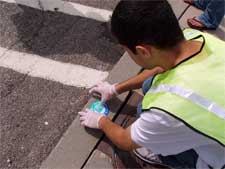 Marking storm drains in Narragansett to discourage dumping
Marking storm drains in Narragansett to discourage dumping
KINGSTON, R.I. – September 19, 2008 – University of Rhode Island students are taking important steps to protect Narragansett Bay as part of a community service program through a URI 101 class and the Feinstein Enriching America Program.
On Saturday, Sept. 20, they will be marking storm drains throughout Narragansett with blue and green “Don’t Dump, Drains to Bay” labels to remind people not to dispose of pollutants or other materials into or near storm drains. The students marked drains around the URI Kingston campus earlier in the week.
The project is conducted in collaboration with Save the Bay, the town of Narragansett, and the Rhode Island chapter of the Surfrider Foundation, with support from Blue Wave Pizza.
A recent survey found that many Rhode Islanders think that water entering storm drains leads to a water treatment plant. “Unfortunately, that’s usually not the case,” said Vanessa Venturini, the storm drain marking coordinator at URI Cooperative Extension. “People are surprised to learn that most storm drains connect directly to our local rivers, lakes, ponds and eventually Narragansett Bay.”
When it rains, water collects remnants of litter, motor oil, bacteria from pet waste, excess fertilizers and pesticides, and leaves and grass clippings. This polluted stormwater runs off hard surfaces to storm drains and then directly to local waters. Pollutants in stormwater close beaches and fishing grounds, threaten water resources, harm natural areas, and contribute to flooding.
According to Venturini, people unknowingly contribute to water pollution every day. “A simple act, such as washing your car in the driveway, fertilizing the lawn, or walking your dog could substantially damage water quality,” she said.
Among the steps Venturini says can help prevent stormwater pollution are:
– Never dump, wash, or rake anything into the path of a storm drain.
– Sweep spilled fertilizers and grass clippings off sidewalks and driveways and back onto the lawn.
– Divert rooftop runoff to a rain barrel or onto the lawn rather than a driveway. Collected water can even be used for watering plants.
– Reduce the amount of fertilizers and pesticides that you apply to your lawn. It will save money, too!
– Never put hazardous household wastes down storm drains, indoor drains, or the trash. Call the Eco Depot to dispose of these wastes (401-942-1430 x 241).
– If you have a septic system, have it inspected every year, and have it pumped at least every three to five years.
– Wash your vehicle at a designated car wash or on grass—not in the driveway.
– Scoop your dog’s poop. Then throw it in the trash.
In addition to marking storm drains, URI students will also be taking part in the International Coastal Cleanup, an event held around the world to remove litter from beaches, sponsored locally by the Audubon Society of Rhode Island.
“By participating in the International Coastal Cleanup, students will really be able to make the connection between litter entering storm drains in the streets and ending up on our beaches,” said Venturini.
The storm drain marking project is a partnership between the Rhode Island Stormwater Solutions campaign, sponsored by the Rhode Island Departments of Transportation and Environmental Management, and URI, Save The Bay, the Surfrider Foundation, the Audubon Society and the town of Narragansett.
For more information on how to reduce water pollution visit www.RIStormwaterSolutions.org or contact Vanessa Venturini at VVenturini@mail.uri.edu to volunteer for future storm drain marking events.

